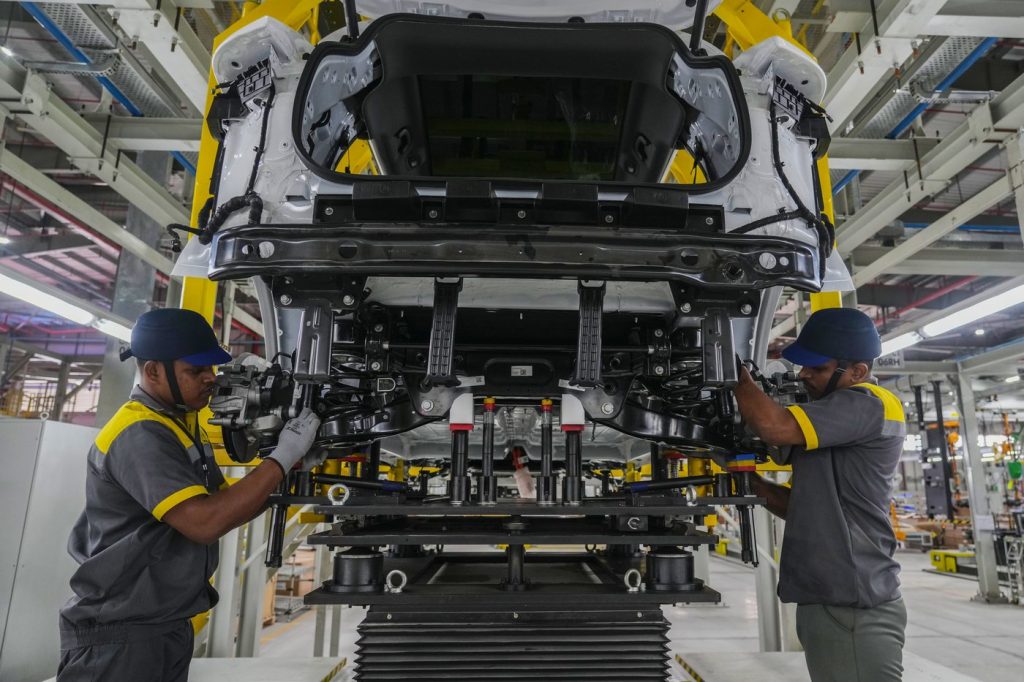THOOTHUKUDI, India (AP) — On Monday, Vietnam's Vinfast officially opened a $500 million electric vehicle (EV) plant in Thoothukudi, located in the southern Indian state of Tamil Nadu. This facility is part of Vinfast's broader strategy, which includes a planned total investment of $2 billion in India and aspirations for expansion across Asia.
The newly inaugurated factory aims to produce an initial output of 50,000 electric vehicles annually, with the potential to scale up production to 150,000 vehicles. Its strategic location near a major port in one of India's most industrialized states positions Vinfast as a key player for future exports to other regions. The company anticipates generating over 3,000 jobs for the local workforce.
In selecting Tamil Nadu, Vinfast looked at 15 different sites across six Indian states, ultimately choosing this state for its robust auto industry, skilled labor pool, and strong infrastructure. Tamil Nadu's Industries Minister T.R.B. Raaja highlighted the importance of this investment, stating it could foster a new industrial cluster in southern Tamil Nadu, which is essential for India to become a global manufacturing hub.
Vinfast's expansion into India is reflective of a strategic pivot towards Asian markets, particularly following challenges in the U.S. and European markets. The company is also building a $200 million EV assembly plant in Indonesia with plans for an annual production of 50,000 vehicles, alongside further expansions in Thailand and the Philippines. In 2024, Vinfast announced sales of nearly 97,000 vehicles, tripling sales from the previous year, but just 10% were outside Vietnam.
India, now the world’s third-largest car market, offers a compelling mix of opportunity: a rapidly growing economy, increasing adoption of electricity vehicles, and government policies that favor local manufacturing. Ishan Raghav, managing editor of the Indian car magazine autoX, stated, "It is a market that no automaker in the world can ignore."
The growth of the EV market in India has primarily been driven by two- and three-wheelers, which represented 86% of the over six million EVs sold in the previous year. Although four-wheel passenger EVs comprised only 2.5% of car sales in India last year, these sales have significantly increased, rising over 110,000 in 2024 from just 1,841 in 2019. The Indian government aims for EVs to account for one-third of all passenger vehicle sales by 2030.
According to Charith Konda from the think-tank Institute for Energy Economics and Financial Analysis (IEEFA), the Indian electric vehicle story began to gain traction only a few years ago. Newer models, equipped with enhanced batteries, quick charging capabilities, and extended driving ranges, are propelling the sector's growth.
As Vinfast plans to enter the Indian market later this year with its VF6 and VF7 SUV models, it faces the challenge of competing with established players like Tata Motors and Mahindra, who dominate the affordable segment, while brands like Hyundai and luxury manufacturers compete at high price points. The Indian consumer base tends to view EVs as secondary cars for urban use, due to unreliable charging infrastructure in other areas.
To resonate with Indian customers, Vinfast is focusing on building a reputation for quality and affordability. The company has plans to establish showrooms and service centers across India, collaborate with local firms for charging solutions and repairs, and reduce costs through battery recycling and local production of key components.
Vinfast has signed agreements to set up 32 dealerships in 27 Indian cities, but it will need to compete with Hyundai, which has established 1,300 locations. Building brand loyalty in India takes significant time; for instance, Hyundai succeeded in doing so over decades with the help of endorsements, including one from Bollywood star Shah Rukh Khan.
To succeed, Vinfast must ensure competitive pricing and gain consumer trust in a competitive market. Gulia, co-founder of JMK Research, emphasizes that if Vinfast can achieve this, it has the potential to thrive.











